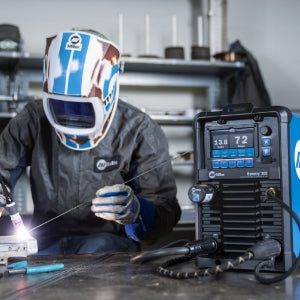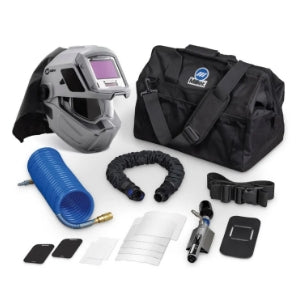Purchasing a welder/generator is a big decision. You want to know you’re getting the best setup for the best deal. When you decide to seal the deal, you want to ensure your welder/generator will last you a long time. Your still-working welder/generator should be at your funeral. Considering the regular price of these machines, it's crucial to make an informed decision. Sadly, so many welder/generator owners don’t know the secrets to everlasting life, meaning their machines take a dirt nap way too soon. Here are a few tips from the industry’s leading professionals on maximizing your welder/generator’s longevity.
A mobile welding solution allows you to take on jobs in various locations, providing flexibility and independence.
Tip 1: The Book of Secrets
Every welding expert will tell you about a book of secrets specifically written with answers to many (often all) of the questions you’ll have about improving the lifespan of your welder/generator — and it comes with your machine. That’s right, it’s the user manual. We know it’s not exactly an exciting read. Sadly, manuals tend to be packed with legal disclaimers, making flipping through them daunting. But the amount of important information they contain about maintaining your machine makes it worth the pain. For instance, most welders don’t change the air filters on their machines simply because they don’t know when and how. Almost every user manual lists how often maintenance tasks should be performed and the right way to do said tasks.
If you’re like 90% of the human race, your user manual was thrown away when you opened the box. Twenty years ago, that was bad news. But today, you can easily go online and find almost any user manual for any type of machine. Just search your machine + “user manual” in your favorite search engine.
The welder/generator's reliable and uninterrupted power ensures stable amperage and operation without being tied to the power grid.
Tip 2: Friction Is Bad
Unlike a standard welder, a welder/generator has a gas-powered engine. That means a lot of fast-moving parts are experiencing lots of heat. Anytime fast-moving metal parts touch one another, bad things start to happen. To avoid metal-on-metal contact, engines use lubricants (such as oil) to prevent damage. The problem is that your oil loses its lubricating properties over time and after repeated use. If left unchecked, your machine will begin to grind its metal parts against one another, deteriorating their ability to function.
Avoiding metal-on-metal contact means that oil changes aren’t one of those “I don’t need to do this as often as they say” things. The newest generation of Miller machines features a maintenance meter, letting you know when they need an oil change. If your welder/generator doesn’t have a meter, you will need to come up with your own way to keep track of oil changes. This could be leaving a note on your machine to check the oil after every use or setting the alarm on your phone to remind you to check the oil (just make sure it’s not too far down the road).
Tip 3: Good In, Good Out
Most people get in the habit of putting the cheapest gas into their car. So when they fill up their welder/generator, they naturally use the same gas they put in their vehicle. The problem is that most welders/generators need octane levels of 87 or greater. In most areas of the country, the cheapest gas usually has an octane level of 86 or less. Before filling up, check to ensure your gas has an octane level at or higher than the recommended grade.
Another common problem with fuel is that most welders store their welder/generator gasoline in a canister instead of filling it up directly at the pump. There’s nothing wrong with that as long as you’re not letting it sit all winter. When you burn stale fuel, it creates a varnish that can clog up your machine’s carburetor.
Usually, the fuel stays good for about three months (this can vary depending on your climate and the percentage of ethanol in the fuel). If you’re planning on letting your fuel sit around for longer than that, it can be a good idea to add a fuel stabilizer when you fill up. It’s important to note that fuel stabilizers don’t refresh stale fuel, so if your gasoline has already gone stale, there’s not much you can do. The trick is to simply develop a system to remind you when you bought your fuel and when it’ll go stale. Again, notes work great, as can setting the date on a calendar or on your phone.
These 3 simple tips can make a huge difference in helping you find the fountain of youth for your welder/generator.






